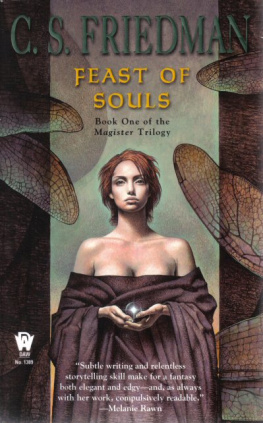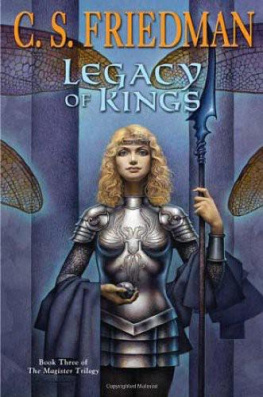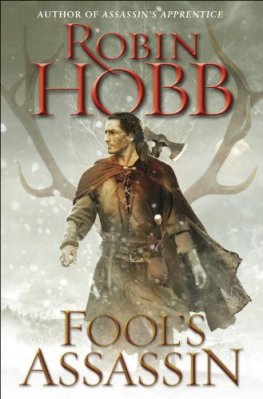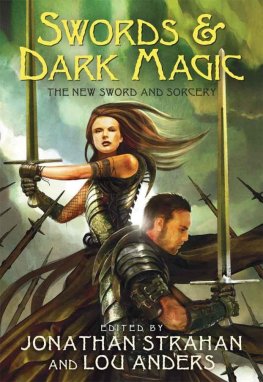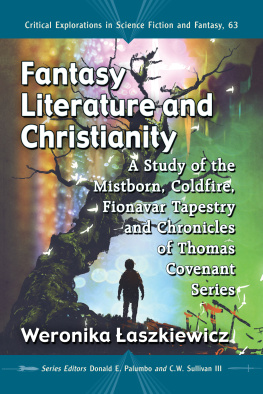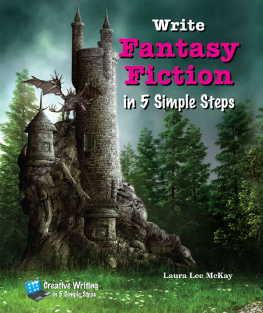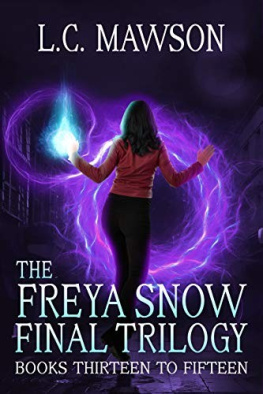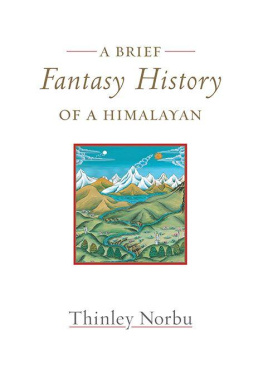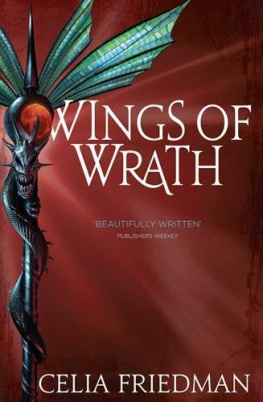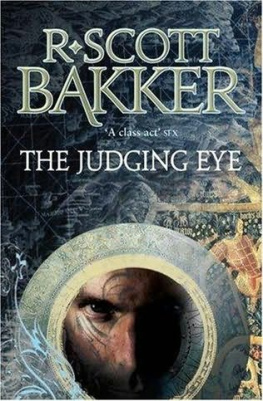Feast of Souls Magister trilogy book 01 By C.S. Friedman
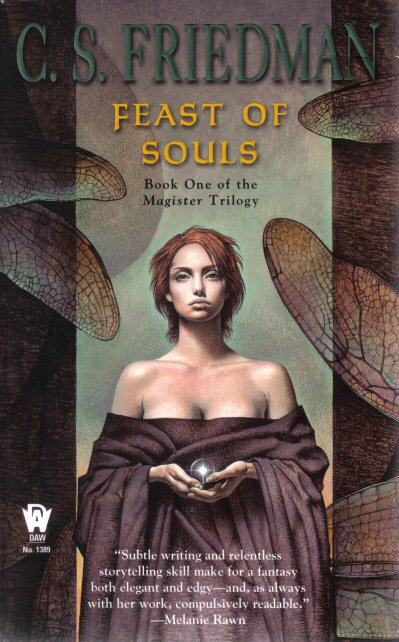
Acknowledgements
This book would not exist without the contributions of one veryspecial person. I regret that I can't give you her real name. She livestwo separate lives, you see, and the one I needed to learn about was athing of shadows and secrets, so different from anything in my ownexperience that I did not feel that reading books about it was enough.I needed a real person, someone willing to share the darkest moments ofher past with me, someone insightful enough to understand how thosemoments shaped her life.
Her clients call her Anna.
With rare candor and boundless generosity this lady opened her heartto me, sharing her memories freely good ones and bad ones,triumphant and troubling, from the desperation that first drove her tosell her body to the rare moments of empowerment she snatched from aworld of exploitation and abuse. Though her I came to understand thesocial and sexual dynamics that had molded my main character in heryouth, and to make her real. Without Anna's counsel, such a projectwould have been nigh on impossible.
So thank you, Anna, for helping bring Kamala to life.
Thanks also to my agent Russ Galen for his creative input into thiswork, and David Walddon as always for being my most insightful critic(and most enthusiastic cheerleader). Also Paul Hoeffer and Carl Ciprafor outstanding commentary upon the work in progress. I couldn't havedone it without you, guys.
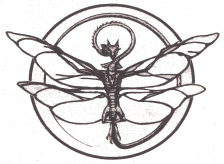
Prologue
Imnea knew when she awoke that Death was waiting for her.
She had been seeing the signs of his presence for some time now. Achill breeze in the corners of the house that wouldn't go away. Shadowsthat seeped in through the windows, that didn't move with the light.The icy touch of a presence upon her skin when she healed the Hardings'little girl, that left her shuddering for hours afterward.
The mirror revealed little. Of course. It wasn't the way of witchingfolk to age and die like normal people. Hie fuel within them wasconsumed too quickly, like a fire into which all the winter's wood hadbeen placed at once. What a blaze it made! Yet quickly gone, all of it,until it smothered in its own ash.
How long ago had the dying begun? Did it start in her youth, whenshe first discovered she could do odd thingstiny littlemiracles, hardly worth notingor not until later? Did Death firstnotice her when she made tiny points of fire dance on the windowsill,with a child's unconscious delight (and how her mother had punished herfor that!), or not until she reached deep within herself with consciousintent to draw strength from her very soulfrom that central fontof spiritual power that mystics called the athraand tobend it to her purpose? When and where was the contract with Deathsealed, and what act marked its closing? The healing of Atkin's boy?The calling of rain after the Great Drought of '92? The day she hadcleansed Dirum's leg of its gangrene, so that they wouldn't have to cutit off?
She was thirty-five. She looked much older.
She felt eighty.
Soon, Death whispered, his voice disguised as the whisper of falling snow. Soon
With a sigh she fed some more wood into the stove and tried to stokeits dying embers to more radiant heat. It had been more than a year nowsince she'd last used the power. She'd hoped that if she stopped, someof her strength would return. Surely whatever internal energies createdthe athra in the first place could restore it to strength, if it was nolonger used for witchery. But even if that were true, how much of herlife was gone already? Each time she had used the magic to heal achild, cast out a demon, or bless a field against the onslaught oflocusts, she had drawn upon her own life force for power. The supplywasn't endless. All the witching folk knew that. Just as the fleshbecame exhausted in time, so did the fires of the spirit bank low,smolder, and finally extinguish. Use the fuel for things other thanstaying alive and the fire would be extinguished that much sooner.
Yet how could you have the power to heal, and not use it? How couldyou watch a child turn blue before you and not clear out its lungs andgive it life again, even if the cost was a few precious minutes of yourown life?
Minutes had seemed like nothing in the beginning. What do youngpeople know of time, especially when the power is pounding in theirveins, demanding expres-sion? By the time you became aware that minutescombine to make hours, and hours add up to days, and days toyears by then Death was already knocking on your door.
No more witchery, she had promised herself a year ago.Whatever time she had left, it would be her own. She had let thevillage know she wouldn't be able to do healing for them anymore, andthat was the end of it. Let them hate her for it if they wished. Itwould be a poor answer to her years of service if they did, but shewouldn't be surprised. Human nature was remarkably ungrateful when itcame to expecting sacrifice of others.
And already it had begun. She had heard the whispers. Every childthat died of the pox now died because of her inaction. Every injurythat led to death now was due to her callousness. Never mind thatillness and injury were a natural part of life that only costlymiracles could defy. Never mind that for two decades she had expendedher own life-energy to provide those miracles. Never mind that Deathwas breathing down her neck now because of those very acts. This yearshe had turned them all away, and that was all that anyone seemed tocare about.
Human nature.
She leaned forward over the fire, trying not to ask herself the question that all the witching folk did, in the end. Was it worth it?Too much danger in that internal dialogue. Answer no, and your lastdays would be filled with regret. Answer yes, and then your dying wasyour own damned fault.
Suddenly a knock on the door drew her from her reverie. Who on earthwas visiting her in these final days, when all the town was treatingher like a pariah?
She walked to the heavy oaken door and pulled it open. By the dyinglight of the winter day she could see two figures standing outside. Noneed to ask what they'd come for. One of the figures held a smallbundle in her arms, and from its size and drape she guessed it to be achild, swathed in blankets. A pang of emotion stabbed her in the heart,guilt and anger hotly combined.
Isn't it enough that I refuse you in the marketplace, in thetemple, in the very streets? Must you bring your sick ones to my verydoor, to be turned away?
For a moment she almost shut the door in their faces, but alifetime's habit of hospitality proved too strong to overcome.Grunting, she stepped aside for the two to come in. By the stove's dimlight she could see them better: a tall, gaunt woman, peasant-born, whohad clearly seen better days, and a young girl by her side, hardlylooking better. The kind you healed and sent home knowing that Deathmight claim them the next year anyway, from starvation or abuse or anyone of the thousand things no witching power could heal. The girl had ahard edge about her, as if she had already seen the rotting underbellyof the world and become inured to its stink; it was a frightening look,in one so young. The woman looked merely desperate.
"Mother," the woman began respectfully. "I'm sorry to bother you"
"I don't do healing any more," Imnea said curtly. "If you want a cupof tea to warm you before you set on your way again I'll give you that.I might have a scrap of bread. But that's all."
Next page
